关于网络教育的英语作文
关于对网络教育的看法的英语作文
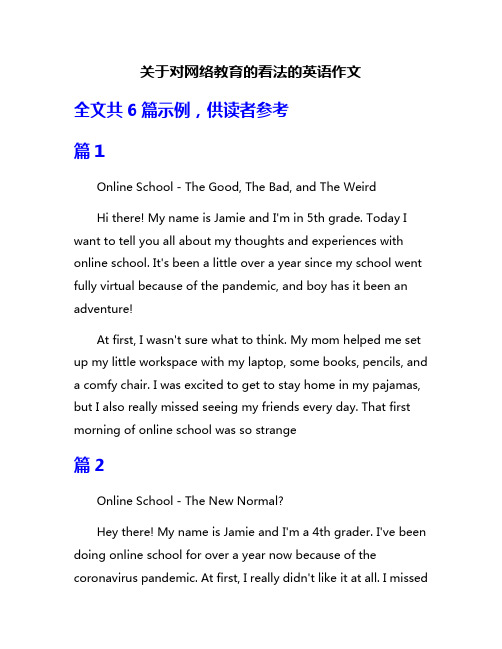
关于对网络教育的看法的英语作文全文共6篇示例,供读者参考篇1Online School - The Good, The Bad, and The WeirdHi there! My name is Jamie and I'm in 5th grade. Today I want to tell you all about my thoughts and experiences with online school. It's been a little over a year since my school went fully virtual because of the pandemic, and boy has it been an adventure!At first, I wasn't sure what to think. My mom helped me set up my little workspace with my laptop, some books, pencils, and a comfy chair. I was excited to get to stay home in my pajamas, but I also really missed seeing my friends every day. That first morning of online school was so strange篇2Online School - The New Normal?Hey there! My name is Jamie and I'm a 4th grader. I've been doing online school for over a year now because of the coronavirus pandemic. At first, I really didn't like it at all. I missedbeing in an actual classroom, seeing my friends every day, and getting help from my teacher in person. Virtual learning was so different and kind of confusing. But you know what? After getting used to it, I've realized online school isn't all that bad! There are actually some good things about it that I hadn't considered before. Let me tell you about the pros and cons from a kid's point of view.The ConsI'll start with the downsides since that's what I noticed right away when we first went online. The biggest problem for me was not being able to interact much with the teacher and other students. We have video meetings, but it's just not the same as being together physically. I couldn't just raise my hand to ask a question - I had to type it in the chat or unmute myself, which was kind of annoying. Sometimes there would be tech issues and everyone's video would freeze up or the audio would get glitchy. It was really hard for the teacher to keep everyone engaged and paying attention too. A bunch of kids would just turn off their cameras and start zoning out or goofing around.Another bad thing is that it's easy to get distracted at home. My game consoles and other fun stuff are right there, tempting me. And there's always background noise happening with mylittle brother running around or my parents watching TV. The classroom is a dedicated space for learning without those kinds of interruptions. At home, I have to work a lot harder to ignore the distractions and stay focused.I also really miss my friends a ton. We used to spend all day every day together at school. Now the only time I get to see them is for short video hangouts after classes are done for the day. It's not the same as getting to play together at recess, sit beside each other at lunch, or just hang out and chat in the halls between classes. I've felt pretty isolated and lonely at times without that social aspect.There's also a lot more homework and assignments to do on our own time with online school. The teachers can't properly teach all the lessons during our shortened video calls, so we have to do a lot of self-studying from textbooks, videos, and websites they assign us. I'm not gonna lie - it's been really hard for me to stay motivated and get all that independent work done, compared to when I was in the classroom following the teacher's guidance all day.The ProsOkay, enough about the negative stuff! As I got more accustomed to the online format over time, I started noticingsome nice advantages too. One of the biggest ones is that I can study at my own pace. If I'm finding a lesson too difficult, I can rewatch the videos as many times as I need or spend extra time reading over the materials. And if I get things quickly, I don't have to keep re-learning the same stuff over and over while the rest of the class catches up. I can just move on to the next topic or start on the homework. Having that flexibility is awesome for matching my own learning style and speed.It's also way more comfortable and convenient being at home. I can just roll out of bed a few minutes before class in my pajamas instead of having to get fully dressed and travel to school. And when I'm feeling hungry or need a snack, my kitchen is right there! No more getting hangry waiting hours for the lunch period. The bathroom situation is a lot better too - no more asking the teacher for a hall pass or dealing with gross school bathrooms.Speaking of being at home, it's nice getting to spend way more time with my family during the day. We still have to follow the school schedule, but in between classes I can hang out with my parents and little brother. We eat meals together, play games, watch movies, whatever. My baby brother was basically a newborn when the pandemic started, so I've gotten to see himgrow up way more than I would have if I was gone at school all day every day like before.Another plus is that I don't have to wake up ridiculously early to get ready and make it to school on time. My first class doesn't start till 9am, so I can sleep in a bit later than when I had to be up and out the door by 7am for in-person school. As a kid, getting those extra hours of sleep is life-changing! No more feeling like a zombie during morning lessons.And finally, being online has helped me get way more comfortable with technology and computers. Our school lives are just so digital and virtual now - emailing teachers, turning in assignments online, videoconferencing, etc. I've become a pro at using all these tools and apps that are probably going to be really important skills to have when I'm an adult and in the workforce someday. So in a way, online school has prepared me for what life will be like in our modern, computer-based world.The VerdictWell, those are some of the biggest pros and cons I've experienced so far with virtual learning. It's definitely been an adjustment, but I've grown to see the good and the bad in it. If I had to pick, I'd still prefer in-person school overall. There's just no substitute for that face-to-face interaction and all the funsocial aspects kids miss out on virtually. But I don't think online options are ALL bad - they allow for more flexibility, comfort, and future tech skills.Maybe moving forward, schools could try to find a nice balance between virtual and in-person learning? Like, have us come to the classroom a few days a week to listen to lessons, ask questions, and hang out with friends. Then we could also learn from home on the other days through video lessons, allowing for that independent pacing. That way we get the best of both worlds! Just an idea from a 4th grader trying to make the most of this crazy situation. Whatever happens, I'm sure my school experience will have plenty more changes and new "normals" in store!篇3My Thoughts on Online LearningHi there! My name is Emma and I'm a 10-year-old student in the 5th grade. I wanted to share my thoughts and experiences with online learning, since it's become such a big part of education these days.Like most kids my age, I've had to do a lot of online classes and virtual learning over the past few years. At first, I'll admit Iwasn't too excited about it. I really missed being in the classroom with my friends and teachers. There's just something special about being together in person that a computer screen can't quite capture.But as time went on, I started to see some of the benefits of online learning too. One of the best things is that I can learn at my own pace. If I need a little extra time to understand a concept, I can rewatch the lesson video or look things up online. And if I'm finding something really easy, I can just move ahead. It's awesome having that flexibility!Another plus is that I can attend classes from literally anywhere with an internet connection. One time, my family went on a little vacation and I was able to join my online classes right from the hotel room. How cool is that? No more missing out on lessons if you have to travel or can't make it to school for some reason.The technology for online learning has gotten better and better too. In the beginning, there were a lot of technical difficulties with slow internet, frozen video calls, and glitchy software. But now the platforms are much more reliable and user-friendly. My teachers have gotten super skilled at deliveringengaging online lessons with interactive activities, videos, polls, and more. It's almost like being in the classroom, but virtual!That said, there are still some downsides to online learning that I've noticed. One of the biggest is not being able to socialize and collaborate as easily with my classmates. Group projects and discussions just aren't quite the same through a screen. I also find it harder to focus and stay motivated when I'm just sitting at home. The classroom environment with my teachers and friends around me helps keep me on track.Eye strain and excessive screen time is another issue. By the end of a day full of online classes, video meetings, and digital assignments, my eyes can really start to feel tired and strained. My parents are always reminding me to take breaks, look away from the screen, and get up and move around. Too much screen time isn't healthy.There's also the challenge of not being able to directly ask the teacher for help right away if you get stuck or don't understand something. You have to send a message or virtually "raise your hand," and sometimes get delayed responses.Face-to-face interaction is easier.Overall though, I've grown to really appreciate the flexibility and opportunities that online learning provides. It's allowed meto continue my education and growth, despite the disruptions of the past few years. While I do look forward to spending more time back in physical classrooms, I think online learning will remain an important part of the future of education.If done right, with good technology, engaging material, and a balance of in-person and virtual learning, it can be an amazing tool. As long as there are still plenty of opportunities for hands-on activities, group projects, and social interaction too. That's really important for us kids. We need to develop those skills for the future workforce and the real world.For now though, I'm just taking it one day at a time, making the most of both online and in-person learning. I've realized that having options and finding what works best for your personal learning style is key. Not everyone learns the exact same way. A blend of traditional classroom instruction and digital/virtual learning could be the ideal approach. Only time will tell how it all evolves!But those are just my thoughts as a 10-year-old navigating this brave new world of education. What's been your experience with online learning so far? I'd love to hear other perspectives! Learning never stops, whether it's online or off. The mostimportant thing is keeping an open mind and making the most of every opportunity. Happy learning!篇4The Rise of Online School: A Kid's ViewWhen the COVID-19 pandemic hit, schools had to close down. At first, I was super excited because it meant no more waking up early, no more homework, and lots of free time! But after a few weeks, I started to miss my friends, my teachers, and the whole school experience.That's when my mom told me we would be starting "online school." I had no idea what that meant at first. How can you go to school online? Isn't school supposed to be in an actual building with classrooms and everything?Well, I quickly found out that online school is where you log into a website or app and have virtual classes with your teacher and classmates. Instead of sitting at desks, we were all on little boxes on a computer screen. It was really weird at the beginning!The first few days of online classes were just pure chaos. Some kids didn't know how to unmute themselves, others were making silly faces at the camera, and the teachers struggled toget everyone's attention. I remember laughing so hard at my friend Erik who somehow logged in upside-down for an entire lesson! We just weren't used to this new way of learning.But as time went on, we all got the hang of it. We learned keyboard shortcuts, when to mute and unmute, and how to use all the online tools like screen sharing and breakout rooms. The teachers also stepped up their game with fun digital activities and games to keep us engaged. Shout out to Mrs. Martin for the awesome Kahoot! quizzes!But overall, I was surprised by how well online learning worked once we figured it out. I could still learn new things, ask questions, and interact with my classmates (even if it was through a screen). The experience wasn't quite the same asin-person school, but it was better than not having any school at all during the lockdowns.Now that pandemic restrictions have eased up, we've gone back to regular in-person classes. Part of me is relieved because I really missed the social aspect and hands-on learning of a normal school day. But I'm honestly going to miss some elements of online school too.I liked being able to learn in my comfy clothes and not having to wake up super early to get ready. The short breaksbetween classes were also nice to grab a snack or play for a few minutes. And let's be real - submitting assignments online is way easier than printing out papers!In the end, I think online school was a interesting experience that taught me a lot about technology, self-discipline, and flexibility. While I don't want to do it forever, I could see online components being useful from time to time, like doing distance learning during snow days or if someone is sick for an extended period.Who knows, maybe when I'm an adult there will be awesome virtual reality classrooms or robot teachers or something! For now, I'm just grateful that during an unpredictable time, online school allowed us kids to keep learning and growing. It was an adventure for sure, but one I'll never forget.篇5Online Learning: A Kid's ViewHi there! My name is Timmy and I'm a 4th grader. Today, I want to share my thoughts on this new thing called "online learning" or "virtual school" that we've been doing lately because of the pandemic. It's quite different from regular school, that's for sure!When we first started online classes, I have to admit, I was pretty excited. No more waking up super early, wearing a uniform, or riding the smelly school bus? Sign me up! I could just roll out of bed 5 minutes before class and log in wearing my pajamas. How awesome is that?The first few weeks were kind of fun and felt like a vacation of sorts. My classes were shorter, there were way fewer assignments, and I got to learn from the comfort of my bedroom. No more raising my hand to go to the bathroom or ask a question - I could just unmute myself. And if I got bored, I could sneakily play video games off-screen without my teacher knowing. Living the dream, right?Well, after the initial novelty wore off, online school started feeling more like...well, actual school. The assignments piled up, the lessons got harder, and I realized this virtual learning thing wasn't just an extended recess. My parents had to nag me to log in on time, pay attention, and get my work done, just like they used to when I attended in-person classes.Don't get me wrong, there are still some cool things about online school that I appreciate. Getting to learn from home in my comfy clothes is really nice. I also like that I can rewatch recorded lessons if I need to. And there's no dealing with mean kids,smelly lunchrooms, or any of the other not-so-fun parts of regular school.But there are also a lot of downsides that make me miss the good old days on campus. For one, it's really easy to get distracted at home. With my video games, toys, and snacks just a few feet away, I find my mind wandering a lot during lessons. At school, it was easier to focus since there weren't as many distractions.I also really miss my friends. Sure, I can see them during our virtual hangouts and classroom meetings. But it's not the same as running around on the playground together, eating lunch side-by-side, or working on group projects in-person. Virtual playdates just aren't as fun.Another bummer about online learning is all the tech issues. Between spotty internet connections, frozen screens, and unknown "error" pop-ups, our classes are constantly getting disrupted. When we were in-person, we didn't have to worry about those kinds of technical difficulties all the time.P.E. class online is pretty lame too. How am I supposed to do jumping jacks and pushups in my tiny bedroom? At school, we at least had big outdoor spaces and actual P.E. equipment to use.Watching the gym teacher demonstrate workouts through a screen just isn't the same.Music, art, and science lab have also been a struggle. How can I properly learn to play the recorder, paint, or do fun experiments from home without the right tools and materials? Those were some of my favorite parts of normal school.So in the end, online learning has been an...interesting experience, to say the least. I'm grateful that it allowed me to continue my education during such an unusual time. And there are some nice perks, like sleeping in later and wearing pajamas to class.But at the end of the day, I really do miss going to actual school. As convenient as virtual learning can be, it's just not the same as being there in-person. I miss my friends, my teachers, the playgrounds, the lunchroom, and all the other little things I used to take for granted.Zoom classes and online assignments are fine for temporary situations. But from a kid's perspective, they'll never compare to the real deal - meeting in-person, playing at recess, doing hands-on activities and experiments, and just being kids at school together. I sure hope we can go back to normal in-person learning soon. Because as fun as online school seemed at first,I've realized there's nothing quite like the genuine classroom experience.篇6Online Learning: A Kid's PerspectiveHi there! My name is Timmy and I'm 10 years old. I love playing video games, riding my bike, and hanging out with my friends. But you know what else I've grown to really enjoy? Online learning!When the pandemic hit a few years ago, my school had to switch to virtual classes for a while. At first, I wasn't too excited about it. I missed seeing my classmates and teachers in person. And having to sit in front of a computer for hours was kind of a drag. But as time went on, I discovered some pretty cool things about online learning.One。
对于网上教育的观点英语作文
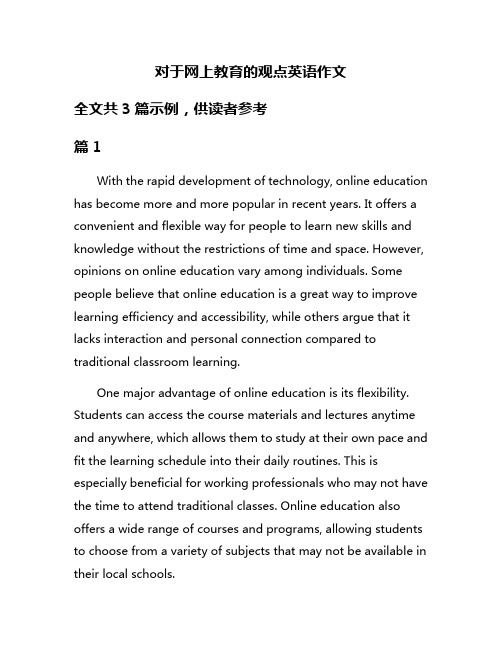
对于网上教育的观点英语作文全文共3篇示例,供读者参考篇1With the rapid development of technology, online education has become more and more popular in recent years. It offers a convenient and flexible way for people to learn new skills and knowledge without the restrictions of time and space. However, opinions on online education vary among individuals. Some people believe that online education is a great way to improve learning efficiency and accessibility, while others argue that it lacks interaction and personal connection compared to traditional classroom learning.One major advantage of online education is its flexibility. Students can access the course materials and lectures anytime and anywhere, which allows them to study at their own pace and fit the learning schedule into their daily routines. This is especially beneficial for working professionals who may not have the time to attend traditional classes. Online education also offers a wide range of courses and programs, allowing students to choose from a variety of subjects that may not be available in their local schools.Another benefit of online education is its affordability. Online courses are often less expensive than traditional classroom learning, as they do not require students to commute to a physical campus or pay for room and board. This makes education more accessible to people from differentsocio-economic backgrounds, giving them the opportunity to pursue higher education and advance their careers.However, some people argue that online education lacks the personal interaction and social aspect that traditional classroom learning provides. In a physical classroom, students have the opportunity to engage with their peers and professors, participate in discussions, and work on group projects. This face-to-face interaction fosters a sense of community and collaboration that is often missing in online education. Additionally, some students may struggle with the self-discipline and motivation required for online learning, as they may be easily distracted by other responsibilities or lack the accountability of attending classes in person.In conclusion, online education has its pros and cons, and its effectiveness largely depends on the individual learner and their learning preferences. While online education offers flexibility and affordability, it may not provide the same level of interaction andengagement as traditional classroom learning. It is important for educators and institutions to continue to improve and innovate online education platforms to address these challenges and provide a quality learning experience for all students.篇2With the rapid development of the Internet and digital technology, online education has become increasingly popular in recent years. This trend has brought about significant changes in the way people learn and acquire knowledge. From online courses and tutorials to virtual classrooms and webinars, the possibilities for online education are endless.There are several reasons why online education has gained such widespread popularity. One of the key advantages is the flexibility and convenience it offers. Students can learn at their own pace and in their own time, without the need to physically attend a traditional classroom. This flexibility is particularly beneficial for those who have busy schedules or commitments that make it difficult to attend regular classes.Another advantage of online education is the accessibility it provides. With a computer and an internet connection, anyone can access a wealth of educational resources and informationfrom anywhere in the world. This has opened up opportunities for people in remote or disadvantaged areas to access quality education that they may not have had access to otherwise.Online education also allows for personalized learning experiences. With the use of online platforms and tools, educators can tailor their teaching methods to suit the individual needs and learning styles of their students. This can result in a more effective and engaging learning experience for students, as they are able to progress at their own pace and focus on areas where they may need additional support.Despite the many advantages of online education, there are also some challenges and criticisms associated with this mode of learning. One of the main concerns is the lack of face-to-face interaction between students and teachers. This can make it difficult for students to ask questions, seek clarification, or engage in discussions with their peers. Some critics argue that this lack of personal interaction can hinder the learning process and diminish the overall quality of education.Another criticism of online education is the issue of credibility and accreditation. With the abundance of online courses and programs available, it can be difficult for students to determine which are reputable and provide quality education.Some online institutions may not have proper accreditation or certification, leading to concerns about the value and recognition of their degrees or qualifications.In conclusion, online education has revolutionized the way people learn and acquire knowledge in the digital age. While it offers numerous advantages in terms of flexibility, accessibility, and personalized learning, there are also challenges and criticisms that need to be addressed. As online education continues to evolve and grow, it is important for educators, policymakers, and students to work together to ensure that it remains a valuable and effective form of learning for all.篇3With the rapid development of technology and the internet, online education has become increasingly popular in recent years. Many people believe that online education is a convenient and flexible way to learn, while others are skeptical about its effectiveness and quality. In this essay, I will discuss the pros and cons of online education and provide my own perspective on this controversial topic.One of the main advantages of online education is its flexibility. Students can access course materials and lectures atany time and from anywhere, which allows them to study at their own pace and schedule. This is especially beneficial for working professionals or individuals with busy schedules who may not have the time to attend traditional classes. In addition, online education eliminates the need for commuting to and from a physical campus, saving both time and money.Another advantage of online education is its accessibility. With the internet, students have access to a wide range of courses and programs from universities and institutions around the world. This allows individuals to choose courses that best suit their interests and career goals, regardless of their location. Online education also provides opportunities for individuals who may not have access to traditional education due to financial or geographical constraints.Despite its advantages, online education also has its drawbacks. One of the main concerns is the lack of face-to-face interaction between students and instructors. This can make it difficult for students to engage in discussions, ask questions, and receive immediate feedback. In addition, some critics argue that online education may not be as effective as traditional classroom instruction in terms of fostering critical thinking skills and promoting social interaction.Furthermore, there are concerns about the quality of online education programs. Some online courses may be poorly designed or lack proper accreditation, leading to a devaluation of the credentials obtained through these programs. In addition, online education may not be suitable for all learners, as some individuals may require more structure and guidance than can be provided in an online setting.In conclusion, online education has both advantages and disadvantages. While it offers flexibility and accessibility to a wide range of courses, there are concerns about its effectiveness and quality. Ultimately, the success of online education depends on the individual learner and their ability to adapt to this new learning environment. As technology continues to evolve, it is important for educators and institutions to address these concerns and continually improve the quality of online education programs.Overall, I believe that online education has the potential to revolutionize the way we learn and acquire knowledge. However, it is crucial for educators and institutions to address the challenges associated with online education and ensure that it meets the needs of all learners. By harnessing the power oftechnology and innovation, online education can truly become a valuable and effective tool for lifelong learning.。
网络教育流行的原因英语作文

网络教育流行的原因英语作文The popularity of online education can be attributed to several factors. Firstly, the convenience and flexibility that online education offers is a major draw. Students can access course materials and lectures from anywhere at any time, allowing them to study at their own pace and fit their education around other commitments. This flexibility is particularly appealing to those who are working or have other responsibilities.Secondly, online education often provides a wider range of course options compared to traditional education. With online platforms, students can choose from a variety of subjects and programs that may not be available in their local area. This opens up opportunities for individuals to pursue their interests and passions in a way that was not possible before.Additionally, online education is often more affordable than traditional education. Many online courses and programs are offered at a lower cost compared to their on-campus counterparts. This makes education more accessibleto individuals who may not have the financial means to attend a traditional institution.Another reason for the popularity of online education is the ability to learn at one's own pace. Online coursesoften provide self-paced learning options, allowingstudents to progress through the material at a speed that suits them. This personalized approach to learning can be beneficial for individuals who need more time to grasp concepts or for those who want to accelerate their learning.Furthermore, the advancements in technology have greatly enhanced the effectiveness of online education. Interactive multimedia tools, online discussion forums, and virtual classrooms provide opportunities for engaging and collaborative learning experiences. These technological advancements have made online education more interactiveand immersive, helping students to better understand and retain the information.In conclusion, the popularity of online education can be attributed to its convenience, flexibility, accessibility, affordability, personalized learning, and technological advancements. These factors have made online education anattractive option for individuals seeking to further their education or acquire new skills.网络教育流行的原因有多个。
关于网络教育的英语作文
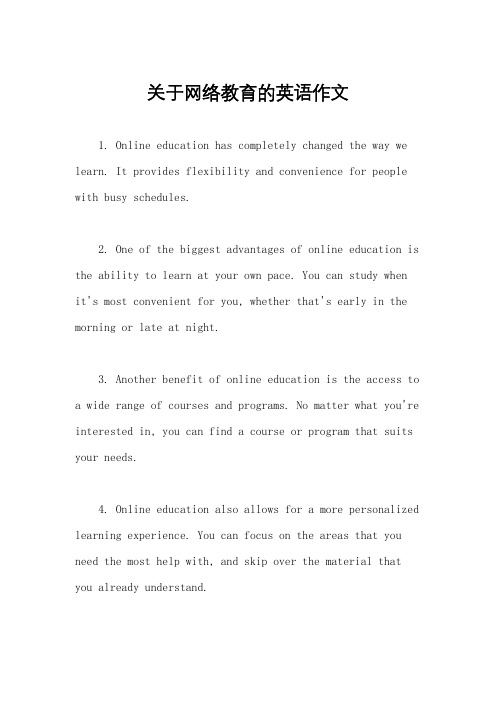
关于网络教育的英语作文1. Online education has completely changed the way we learn. It provides flexibility and convenience for people with busy schedules.2. One of the biggest advantages of online education is the ability to learn at your own pace. You can study whenit's most convenient for you, whether that's early in the morning or late at night.3. Another benefit of online education is the access toa wide range of courses and programs. No matter what you're interested in, you can find a course or program that suits your needs.4. Online education also allows for a more personalized learning experience. You can focus on the areas that you need the most help with, and skip over the material that you already understand.5. However, online education does have its challenges. It requires a high level of self-discipline and motivation to stay on track with your studies.6. In addition, online education may not be suitable for everyone. Some people learn better in a traditional classroom setting with face-to-face interaction.7. Despite these challenges, online education has become increasingly popular and is likely to continue growing in the future. It offers a valuable alternative to traditional education for many people.。
远程教育(英语作文四篇)
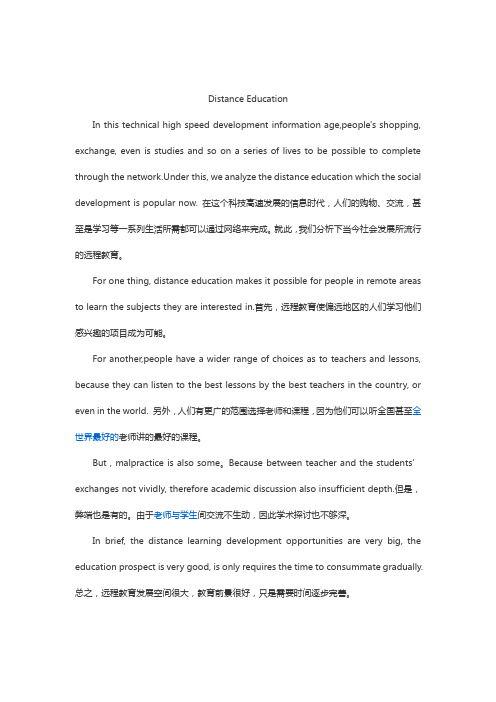
Distance EducationIn this technical high speed development information age,people's shopping, exchange, even is studies and so on a series of lives to be possible to complete through the network.Under this, we analyze the distance education which the social development is popular now. 在这个科技高速发展的信息时代,人们的购物、交流,甚至是学习等一系列生活所需都可以通过网络来完成。
就此,我们分析下当今社会发展所流行的远程教育。
For one thing, distance education makes it possible for people in remote areas to learn the subjects they are interested in.首先,远程教育使偏远地区的人们学习他们感兴趣的项目成为可能。
For another,people have a wider range of choices as to teachers and lessons, because they can listen to the best lessons by the best teachers in the country, or even in the world. 另外,人们有更广的范围选择老师和课程,因为他们可以听全国甚至全世界最好的老师讲的最好的课程。
But,malpractice is also some。
Because between teacher and the students’exchanges not vividly, therefore academic discussion also insufficient depth.但是,弊端也是有的。
写出网络教育的利与弊英语作文,简单粗暴
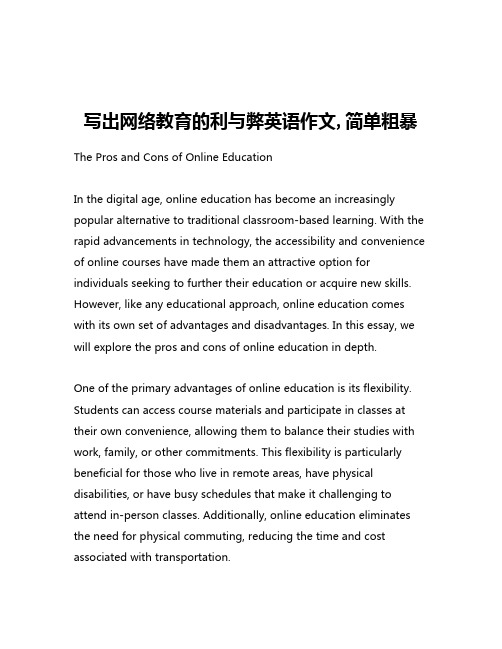
写出网络教育的利与弊英语作文,简单粗暴The Pros and Cons of Online EducationIn the digital age, online education has become an increasingly popular alternative to traditional classroom-based learning. With the rapid advancements in technology, the accessibility and convenience of online courses have made them an attractive option for individuals seeking to further their education or acquire new skills. However, like any educational approach, online education comes with its own set of advantages and disadvantages. In this essay, we will explore the pros and cons of online education in depth.One of the primary advantages of online education is its flexibility. Students can access course materials and participate in classes at their own convenience, allowing them to balance their studies with work, family, or other commitments. This flexibility is particularly beneficial for those who live in remote areas, have physical disabilities, or have busy schedules that make it challenging to attend in-person classes. Additionally, online education eliminates the need for physical commuting, reducing the time and cost associated with transportation.Another significant benefit of online education is the personalized learning experience it can offer. Online courses often provide students with the ability to learn at their own pace, revisit course materials as needed, and engage in self-paced assessments. This can be especially useful for individuals who have different learning styles or who require more time to grasp certain concepts. Furthermore, online platforms often offer a wide range of multimedia resources, such as video lectures, interactive simulations, and discussion forums, which can enhance the learning experience and cater to diverse learning preferences.Online education also has the potential to be more cost-effective than traditional on-campus programs. The absence of expenses associated with physical infrastructure, such as classrooms, dormitories, and campus facilities, can result in lower tuition fees for online courses. Additionally, students can save on the costs of transportation, housing, and other expenses typically incurred when attending a brick-and-mortar institution.However, online education is not without its drawbacks. One of the primary concerns is the lack of face-to-face interaction and social engagement. In a traditional classroom setting, students have the opportunity to engage in discussions, collaborate with their peers, and build personal connections with their instructors. In an online environment, these social interactions may be limited, potentiallyleading to a sense of isolation and a lack of a vibrant learning community.Another potential downside of online education is the potential for distractions and a lack of self-discipline. Without the structure and accountability of a physical classroom, some students may struggle to stay focused and motivated, leading to a higher risk of procrastination or abandonment of their studies. Additionally, the lack of in-person supervision and immediate feedback from instructors can make it more challenging for students to stay on track and receive timely support when needed.Furthermore, the quality of online education can vary greatly, and the credibility of some online institutions may be questionable. It is essential for students to thoroughly research and evaluate the reputation, accreditation, and course offerings of any online program before enrolling. Poorly designed or delivered online courses can result in a subpar educational experience and may not provide the same level of rigor and academic standards as traditional on-campus programs.Finally, the technological requirements for online education can be a barrier for some students. Reliable internet access, appropriate hardware, and proficiency in using digital tools are necessary for successful participation in online courses. Students fromunderprivileged backgrounds or those with limited technological resources may face additional challenges in accessing and engaging with online educational opportunities.In conclusion, the pros and cons of online education must be carefully considered by both students and educational institutions. While online education offers remarkable flexibility, personalized learning, and cost-effectiveness, it also presents challenges related to social interaction, self-discipline, and the quality of the educational experience. As technology continues to evolve and online education becomes more prevalent, it is crucial for stakeholders to address these concerns and work towards creating a more inclusive and enriching online learning environment. Ultimately, the decision to pursue online education should be based on a thorough evaluation of individual needs, learning preferences, and the specific requirements of the chosen program.。
关于网络教育利与弊的英语作文
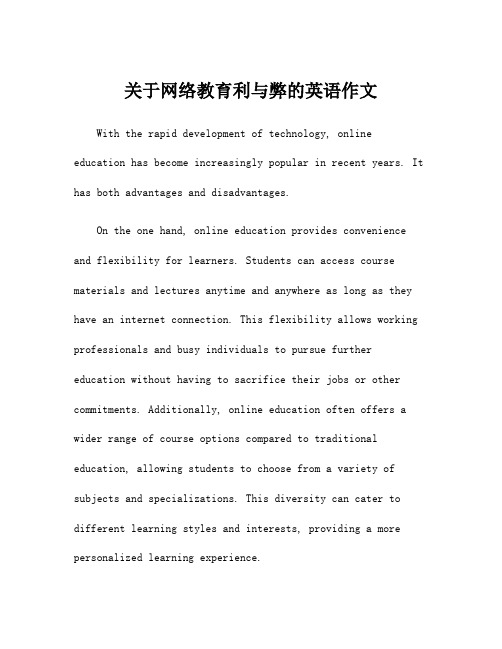
关于网络教育利与弊的英语作文With the rapid development of technology, online education has become increasingly popular in recent years. It has both advantages and disadvantages.On the one hand, online education provides convenience and flexibility for learners. Students can access course materials and lectures anytime and anywhere as long as they have an internet connection. This flexibility allows working professionals and busy individuals to pursue further education without having to sacrifice their jobs or other commitments. Additionally, online education often offers a wider range of course options compared to traditional education, allowing students to choose from a variety of subjects and specializations. This diversity can cater to different learning styles and interests, providing a more personalized learning experience.On the other hand, online education may lack the face-to-face interaction and support that traditional education offers. In a traditional classroom setting, students have the opportunity to engage with their peers and instructors, ask questions, and receive immediate feedback. This personal interaction can foster a sense of community and collaboration among students, as well as deepen their understanding of the course material. In contrast, online education relies heavily on self-discipline and motivation, as students must manage their own learning pace and schedule. Without the structure and accountability of a physical classroom, some students may struggle to stay on track and maintain their motivation.In conclusion, online education has both advantages and disadvantages. While it offers convenience and flexibilityfor learners, it may lack the personal interaction and support of traditional education. Ultimately, the effectiveness of online education depends on the individuallearner and how well they can adapt to the online learning environment.。
网络教育的利弊的英语作文高中
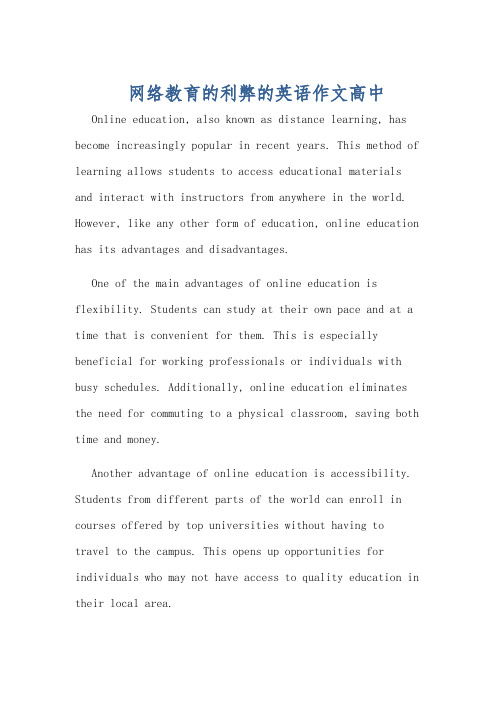
网络教育的利弊的英语作文高中Online education, also known as distance learning, has become increasingly popular in recent years. This method of learning allows students to access educational materials and interact with instructors from anywhere in the world. However, like any other form of education, online education has its advantages and disadvantages.One of the main advantages of online education is flexibility. Students can study at their own pace and at a time that is convenient for them. This is especially beneficial for working professionals or individuals with busy schedules. Additionally, online education eliminates the need for commuting to a physical classroom, saving both time and money.Another advantage of online education is accessibility. Students from different parts of the world can enroll in courses offered by top universities without having totravel to the campus. This opens up opportunities for individuals who may not have access to quality education in their local area.Furthermore, online education encourages self-discipline and self-motivation. Since students are responsible for managing their own time and completing assignments on their own, they develop important skills that are valuable in the workforce.On the other hand, online education also has its drawbacks. One of the main disadvantages is the lack of face-to-face interaction. Traditional classroom settings allow for real-time discussions and debates, which may be lacking in online courses. This can hinder the development of interpersonal skills and the ability to collaborate with others.Another disadvantage of online education is thepotential for distractions. Studying from home or another location can lead to interruptions from family members, household chores, or other responsibilities. Maintaining focus and staying motivated can be challenging in such environments.Additionally, some critics argue that online education may not provide the same level of quality as traditional classroom instruction. Without direct supervision frominstructors, students may struggle to grasp complexconcepts or receive timely feedback on their work.In conclusion, online education offers many benefitssuch as flexibility, accessibility, and the development of important skills. However, it also comes with challenges such as the lack of face-to-face interaction, potential distractions, and concerns about quality. Ultimately, the effectiveness of online education depends on the individual student's learning style and ability to adapt to a digital learning environment.网络教育,也被称为远程学习,在近年来变得越来越受欢迎。
- 1、下载文档前请自行甄别文档内容的完整性,平台不提供额外的编辑、内容补充、找答案等附加服务。
- 2、"仅部分预览"的文档,不可在线预览部分如存在完整性等问题,可反馈申请退款(可完整预览的文档不适用该条件!)。
- 3、如文档侵犯您的权益,请联系客服反馈,我们会尽快为您处理(人工客服工作时间:9:00-18:30)。
关于网络教育的英语作文
E-learning and E-training-网上学习和培训
With the rapid development of technology and people’s demand for education mounting, so-called e-learning, or on-line long distance education, has become very popular and important in China. In some areas, e-learning has played a role traditional classroom education cannot accomplish.
Approximately 90 per cent of the world’s new information is stored and retrieved in English. It is vital for China to use the Olympics as a catalyst to boost English acquisition to prepare itself or the digital revolution. To prepare for the Beijing 20xx Olympic Games, at least 6 million Chinese, including staff for the organizing committee, and in the service, retail, police, volunteer, technical and medical support sectors, reportedly need to improve their English language skills.
E-learning breaks down the barriers of time and location, integrating education resources. When compared with traditional ways of teaching and learning, it is far more cost-effective for both the teachers and the students.
Online Education-网络教育
Recently an online activity has become very “in”. That is online education. 68 online education colleges have been established in the past decade in our country.
Why could online education be so popular in such a short time? Among other reasons, the quick development of internet should be an essential one, which makes all our dreams of attending class in a distance possible. Another underlying reason is the quick development of both society and technology. Today, modern science and technology is developing with lightning
speed. To catch up with this development we all feel an urgent and strong desire to study. While on the other hand, due to the great pace of modern society, most people are too busy to study full time at school. Online education just comes to their aids.
Personally, I appreciate this new form of education. It's indeed a helpful complement to the traditional educational means. It can provide different learners with more flexible and versatile ways to learn. Most of all, with online education, we can stick to our jobs and at the same time study and absorb the latest knowledge.
The Potential of Internet Education-网络教育的潜力
Internet is getting into people's life and becoming more and more popular. Experts are now working on setting up a national long-distance educational system in China to provide educational opportunities via Internet.In reality, the educational via Internet plan has been taking shape. Some universities have already got involved in regional long-distance education, catching the attention of many educators and computer experts worldwide. Others have just connected their campus computers for teaching and research, and provided more opportunities for learners.
The Internet education will be developing dramatically. It's estimated that computerized long-distance teaching networks will be available by 20xx for postgraduate education, vacational programs, teachers' training and employees' training. Moreover, it will soon cover all the corners of China and eventually win the worldwide popularity.。
